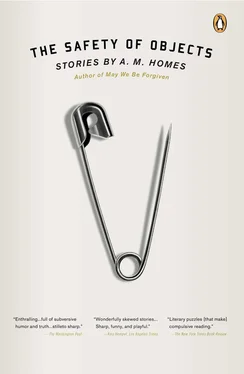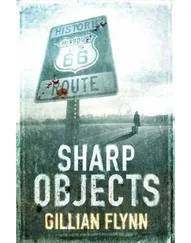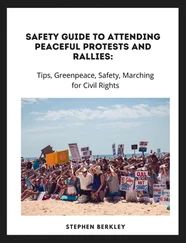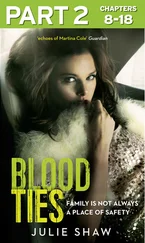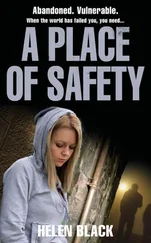“Are you sleeping, Johnny?” Randy asked.
I shook my head.
“What’s wrong with you?”
I shrugged and waited for him to hit me. The Krispies pan was on the coffee table with a couple of pieces left in it. The milk carton was right there too. I reached my foot out and with the tip of my sneaker tipped the pan over. I knocked the pan over right in front of Randy.
He just sat there and looked at me. His face didn’t change. “Feel better now?” he finally asked, sweeping the cards into a pile and then making them into a stack. I shrugged. He stood and I shriveled up. I didn’t mean to, but he was standing over me and that’s just what happened. “Don’t be scared of me, Johnny,” he said. “Be scared of yourself.” He picked up the milk carton and took it into the kitchen. I heard the refrigerator door open and close. I heard Randy pull out a chair and sit down. I got up off the sofa and onto my hands and knees. I picked up the pan, took it into the kitchen, and put it down on the counter.
“’Night, Johnny,” Randy said. He was playing solitaire.
“’Night.” I walked down the hall to my room.
* * *
The next morning Randy was gone. I sat on the living room sofa and waited. I went outside and sat on the concrete front step. Across the dirt that was the front yard there were still pieces of wood that needed to be split and stacked. I picked up the axe. It felt heavier than I remembered. I raised it and went to work. About a half hour later Randy drove up.
“Where’d you go?” I asked.
He shrugged. “Put shoes on,” he said. “Never work outside without shoes.”
I followed him into the house. “I’m sorry for what I did last night,” I said. I’d been rehearsing it in my head all morning.
He nodded.
I went down the hall to get my shoes. Randy was in the kitchen making eggs for himself. “I said I was sorry.”
“I hear you.” He scraped the eggs out of the pan and onto a plate. I kept looking at him and he looked back at me. “Did you finish all the wood?” I shook my head. Randy started to eat and I went outside and kept splitting and stacking.
When the wood was chopped I went into my room and fell asleep. The slap-slapping sound of a basketball woke me up. Randy was dribbling down the hall. He stood in the doorway bouncing the ball. “Get up, Johnny,” he said. “We’re going.”
“Where?”
He shrugged and threw the ball at me, hard.
I caught it. It was my ball. I hadn’t seen it since the night Randy picked me up. I held the ball for a minute and then put it down on the bed.
“Take it with you,” he said.
I followed him out to the car. “Do you know how to drive?”
“I’m way too young.”
“Never too young.” He moved the car seat as far forward as it would go. If I sat so I could see, my legs were nowhere near the pedals. “You’re too short,” Randy said. I slid over so he could drive. He pulled the seat release and the whole front seat slid backward.
“Let’s go fishing again,” I said.
“I don’t think so, Johnny,” he said and I was quiet for a long time. The road turned into highway and I could feel him making the car go faster. It was afternoon. The sun was starting to go down.
“Where are we going?” I asked.
He didn’t say anything for a while. “You’re not the kid I thought you’d be.”
“What does that mean?”
He turned off the highway and we were someplace I’d been before. I turned the basketball around on my lap.
“I’m taking you back,” he said. He made a few turns and I knew where he was.
“What’s wrong with me?”
“You’re not the right kid. You’re not Johnny.” Randy pulled up to the curb right at the bottom of the hill below the basketball courts. This was the exact same place he’d parked when he came up to the courts and called me Johnny. “Get out,” he said. I sat there looking at the dashboard. “You’ve spent three days whining about calling your mother and going home. Now you’re home. Go on, get out.”
“Why?”
He leaned across me and opened the door on my side of the car.
“Out,” he said, shoving my shoulder.
I got out.
Randy pulled away from the curb, turned the car around, and went back down the hill.
I walked home, cutting through the same backyards as always. I walked the same way but everything felt different. All the things I’d always liked, knowing who lived where and what their dog’s name was, only made me feel worse. I went past clotheslines and instead of thinking it was funny to see Mrs. Perkins’s flowered underwear hanging out, I wanted to rip it down. I wanted to take everything down and tear it into a million pieces. I crossed through the Simons’ yard and into our backyard.
Rayanne was there by herself, playing in my sandbox. She was thirteen years old, bigger than my mother, and she was playing in the sandbox. I stood there until she saw me. She looked at me and tried to jump up. She wanted to get up but she did it too fast and didn’t know what she was doing. She fell down and had to get up again. “Erol, Erol,” she said, galloping across the backyard. “Erol,” she said, but it came out sounding like “Error, Error.” She came toward me and I dropped my basketball. I turned and ran back through the yards. I ran until I didn’t know the names of the people in the houses around me. I ran through backyards until I stopped hearing Rayanne’s voice calling Error.
Her thighs spread across the vinyl ropes of the lawn chair. In the heat they seem to melt into the plastic, seeping out from under her shorts, slipping through the vinyl as though eventually she’ll begin dripping fat onto the lawn.
“Chunky?” her mother calls through the sliding glass door. The voice is muffled and sounds like a drowning person talking underwater. “I’m running errands, are you coming with me?”
Cheryl shakes her head. Her second chin rolls across her chest, gliding on a layer of sweat.
“Why not?”
Her mother seems to be gurgling behind the glass. Cheryl doesn’t answer.
“I’m leaving now,” her mother says, and then waits at the glass for several minutes before walking away.
Cheryl lays on the chair in the center of the backyard, her right hand plucking individual blades of grass, her eyes not focused but aimed at a bald spot of lawn, a remnant from another afternoon when she had a similar problem.
They call her Chunky in part after the candy bar, which used to be her favorite. Her mother started it.
Cheryl was eating a bar and refused to give some to her little brother. “Too small to share,” she said, popping it all into her mouth, ending the discussion.
He called her Fatty and poked her in the stomach; his finger sank deep into her flesh.
“Your sister is just chunky,” her mother said.
“You bet she is,” he said.
After that he called her Chunky and then everyone called her Chunky, and then as if being called Chunky actually made her fatter, she truly was Chunky — and she hated that candy bar and switched to Mr. Goodbar but didn’t tell anybody.
Cheryl is fat, only she didn’t know it until now. Before this she always thought of herself as a big girl, a growing girl, a girl who could do anything. Now, in the heat, in the sun, she lies immobile and swollen. She feels larger and larger as if her breath is actually inflating her. She tries not to breathe as much, as deeply. Her double chin presses down onto her chest, onto her windpipe, and she feels like she is suffocating. Cheryl tilts her head back, establishing an airway.
She tilts her head and thinks of models in Vogue who seem like they can tilt anything, like they aren’t people but fully articulated dolls like her brother’s G.I. Joe — G.I. Joke she calls him. She thinks of thin people on beaches, with a breeze slipping over them. She realizes that because they are thin, they are aerodynamic. She pictures herself on the sand and sees a blob exactly like a jellyfish.
Читать дальше
